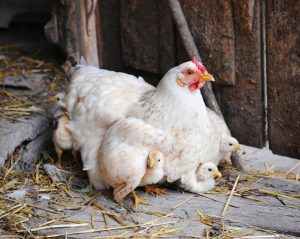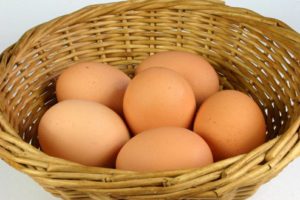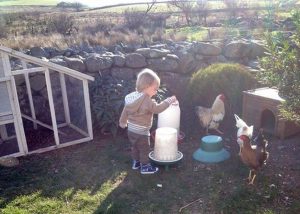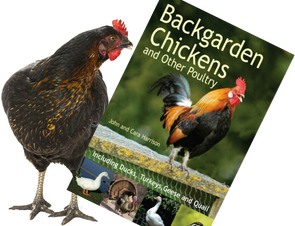 One of the reasons I first started keeping a back garden flock was to have cheaper eggs from hens that lived to higher standards than those in commercial flocks. However, for those debating this I think it is important to note that it can take many years before you are in profit from poultry keeping.
One of the reasons I first started keeping a back garden flock was to have cheaper eggs from hens that lived to higher standards than those in commercial flocks. However, for those debating this I think it is important to note that it can take many years before you are in profit from poultry keeping.
With the costs of buying poultry housing, feeders, drinkers, a poultry first aid kit and then feed costs on top, it is actually quite pricey to get started and you may never fully break even.
You can of course build your own coop and run (the run being needed with seasonal avian flu lockdowns), but even then you have wood costs to take into account. The initial set-up is probably going to cost you at a minimum £500 based on the current cheapest market coops and runs plus basics (if looking at more expensive coops and runs can head into £1000s). As we’re doing this on a budget we’ll use the £500 budget set-up cost.
Poultry Feed Costs
So, lets say your flock of 5 hens is laying on average 3 eggs a day between them – how much does each egg cost in terms of feed? An average hen will eat 100-150g of pelleted feed per day. This is reduced if you live in an area where you can feed scraps to your flock too, so let us take the lower figure of 100g per hen per day. Each day your flock will need 500g of feed to produce 3 eggs on average (lower in Winter, higher in Summer).
At current prices 20kg of standard layers pellets cost £10.60 locally to us – this is an increase of over £3 per sack in the last 12 months. One sack fed at 500g per day would last for 40 days at a cost of 0.25p per day and a cost per egg of 0.08p.
Poultry Additional Costs
On top of feed costs you will have some other ongoing costs. This includes bedding, cleaning solutions, topping up of “first aid” bits such as de-lice and de-wormers. Last year these additional items cost us just under £50.00, so taking into account current inflation lets average that to £55.00 for the current year and 0.15p per day or 0.05p per egg.
If you don’t have a cockerel and want to add new flock members you’ll either have to buy in hatching eggs to use with a broody hen/incubator or buy further POL hens every 2-4 years. The time frame depends on whether hybrid or pure-breed and productivity.
I’ll assume for these calculations buying stock at POL at years 1 and 4. POL hens vary from £8-25+ depending on breed. For a POL pure breed £20 per bird is about average. So, £100 at year one and £100 at year four – that’s 0.27p per day or 0.09p per egg in those years.
Poultry Egg Costs – Years 1-6
So, what does this mean for the egg cost year-on-year? I shall detail some basic sums below.
Year One Poultry Keeping with 5 Hens
Eggs – 1095 per year on average
Initial outlay costs – £500.00: 0.46p per egg
Hens – £100: 0.09p per egg
Poultry Feed Costs – £10.60 every 40 days: 0.08p per egg
Additional Items – £55.00 per year: 0.05p per egg
Total Cost Per Egg = 0.68p
So, if averaging out the initial outlay then year one costs a staggering £4.08 per half dozen eggs.
Year Two Poultry Keeping with 5 Hens
Eggs – 1095 per year on average
Poultry Feed Costs – £10.60 every 40 days: 0.08p per egg
Additional Items – £55.00 per year: 0.05p per egg
Total Cost Per Egg = 0.13p
A half dozen eggs in year two comes in at £0.78
Year Three Poultry Keeping with 5 Hens
Eggs – 1095 per year on average
Poultry Feed Costs – £10.60 every 40 days: 0.08p per egg
Additional Items – £55.00 per year: 0.05p per egg
Total Cost Per Egg = 0.13p
A half dozen eggs in year three comes in at £0.78
Year Four Poultry Keeping with 5 Hens
Eggs – 1095 per year on average
Hens – £100: 0.09p per egg
Poultry Feed Costs – £10.60 every 40 days: 0.08p per egg
Additional Items – £55.00 per year: 0.05p per egg
Total Cost Per Egg = 0.22p
A half dozen eggs in year four comes in at £1.32
Year Five Poultry Keeping with 5 Hens
Eggs – 1095 per year on average
Poultry Feed Costs – £10.60 every 40 days: 0.08p per egg
Additional Items – £55.00 per year: 0.05p per egg
Total Cost Per Egg = 0.13p
A half dozen eggs in year five comes in at £0.78
Year Six Poultry Keeping with 5 Hens
Eggs – 1095 per year on average
Poultry Feed Costs – £10.60 every 40 days: 0.08p per egg
Additional Items – £55.00 per year: 0.05p per egg
Total Cost Per Egg = 0.13p
A half dozen eggs in year six comes in at £0.78
 Average Egg Cost Over Six Years of Poultry Keeping
Average Egg Cost Over Six Years of Poultry Keeping
If you take the egg costs and average them out over the full six years it comes to 0.24p per egg or £1.44 per half dozen. At the time of writing this post the cheapest Tesco half dozen free range eggs came in at £1.50. Obviously there are other variables to take into account such as those who make their own feed or feed more scraps, reducing feed costs. On the flip side those who chose an organic layers pellet will have higher feed costs per egg to compute.
It does pay over time to keep chickens in the garden for eggs, but only if you don’t include your time taken for cleaning and looking after the flock too. The more birds you keep the lower the cost per egg works out to as well, but the average household will not need more than five back garden birds.
In the Summer months when they are laying five eggs a day you’ll feel swamped, but come Winter and you get one or two, sometimes none, you’ll start to debate whether they earn their keep. For us we balance this out by storing the surplus eggs in the Spring and Summer to make up for the lower numbers when the seasons change.
If you do decide to start a back garden flock the most important thing is to plan it properly. Make sure the housing is large enough, the run has enough space and entertainment, and that you go in eyes open to the costs. It is worth it, but planning is crucial for you and your hens.



We bought a purple Eglu and run which seemed a mad extravagance at the time. It has been in use constantly for fifteen years and is still in good condition, so not such a bad investment. We bought a second one on eBay.
We gave surplus eggs to delivery drivers, the postman, the plumber, the neighbours, and anyone who helped us during lockdown. Now we are able to sell a few so that helps with feed costs and pays for the new hens.
We buy two autumn point of lay hybrid chickens a year for some fresh eggs through winter, though I freeze 2 dozen eggs just in case. We have prolific layers of white and light brown eggs, and good layers of blue and dark brown eggs from Sunnyside Poultry in Staffordshire.
We have reduced our flock from eight to the four youngest as feed prices seem set to rise even more. If there are feed shortages it seems wrong to keep an old bird laying one egg occasionally when someone may go out of business for want of livestock feed.
One aspect of the calculation that might have been missed is all the chicken waste and bedding, which makes lovely compost. How much you get through depends on the dimensions of your coop and how often you muck out. But given than compost costs ~£80/m^3 with delivery, even my small flock of 5 pays for itself (or at least cover the bedding-and-healthcare costs) in manure.